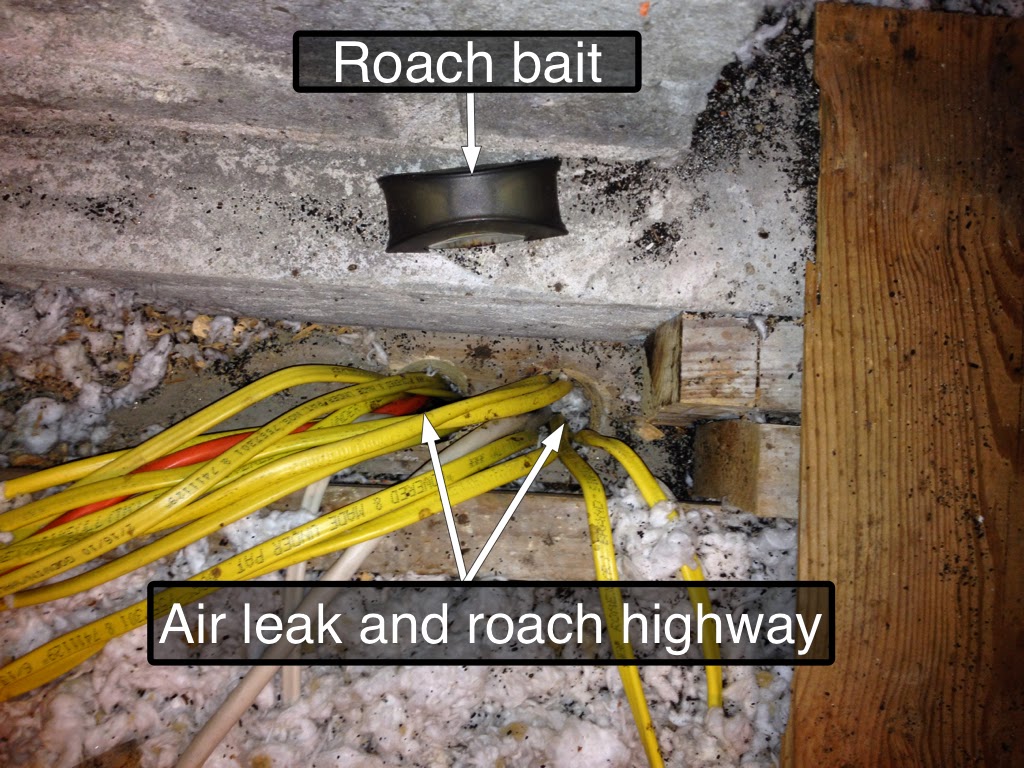Similarly, when all windows, doors, and known sources of leaks in the home are closed, the blower door can then pressurize or depressurize the home and help us to know how much hidden leakage there is.
 It's important to know how much duct leakage and building envelope leakage there is because they can be two of the biggest energy wasters in the home. They can also have a significant impact on comfort and indoor air quality. When air leaks uncontrollably through your home, it often comes from areas you don't want it to, like your attic or crawlspace. This air has the potential to carry pollen, dust, mold spores, humidity, pests, insulation fibers and other contaminants into the home, which we don't want.
It's important to know how much duct leakage and building envelope leakage there is because they can be two of the biggest energy wasters in the home. They can also have a significant impact on comfort and indoor air quality. When air leaks uncontrollably through your home, it often comes from areas you don't want it to, like your attic or crawlspace. This air has the potential to carry pollen, dust, mold spores, humidity, pests, insulation fibers and other contaminants into the home, which we don't want. Most often noticed areas of air leakage in the home are around windows and doors. While these areas are important, they are often not as important as the hidden leaks that are constantly robbing your home of its conditioned air. Energy Star states that the average house has over a half a mile of hidden gaps and cracks. Hidden air leaks in the home are often due to the nature of the construction process. Electrical, Plumbing, and HVAC contractors drill through and cut everything in their way and often these holes don't get sealed.
Most often noticed areas of air leakage in the home are around windows and doors. While these areas are important, they are often not as important as the hidden leaks that are constantly robbing your home of its conditioned air. Energy Star states that the average house has over a half a mile of hidden gaps and cracks. Hidden air leaks in the home are often due to the nature of the construction process. Electrical, Plumbing, and HVAC contractors drill through and cut everything in their way and often these holes don't get sealed.Framing lumber is also extremely rough and doesn't naturally seal well to drywall, plywood, or the foundation. Many recessed lights leak significant amounts of air. Large holes under bathtubs, you name it, there's a gap. These gaps begin to work together to create a chimney effect that works on its own 24 hours a day. In fact, if you added up all the holes in a typical house, it would equate to leaving a large window open all of the time! I have seen more than my share of homes that would equate to a large garage door open all the time!
Duct leakage is important obviously because it blows the air you've just paid to be conditioned directly outside. This means the room the air was intended for gets uncomfortable, and the unit has to run longer. While this is horrible enough alone, that's only the supply (pressurized) side of the system. When the return side of the system leaks, this sucks in air wherever the leak happens to be. Most of the houses in the Charleston area we work on every day have ductwork in the attic or the crawlspace. Often times, this air gets a free pass by coming into the system after the air filter and then gets evenly distributed throughout the home (after it clogs your coil, of course). How's that for indoor air quality?
By now it's pretty obvious why these leaks are important and must be dealt with if we want our homes to be more comfortable, healthy, and efficient. They also begin to tell the story of the "house as a whole". In the world of building science and energy efficiency, these leaks are still just small pieces to a much larger puzzle of the home's overall performance.
Blower door and duct blaster testing are just two of the many important tools we utilize in our comprehensive whole house assessments. At High Performance Homes, we have the experience, training, and passion to help you get the most out of your home. To learn more about our assessment process, click here.
Josh can be reached at (843) 509-7577



